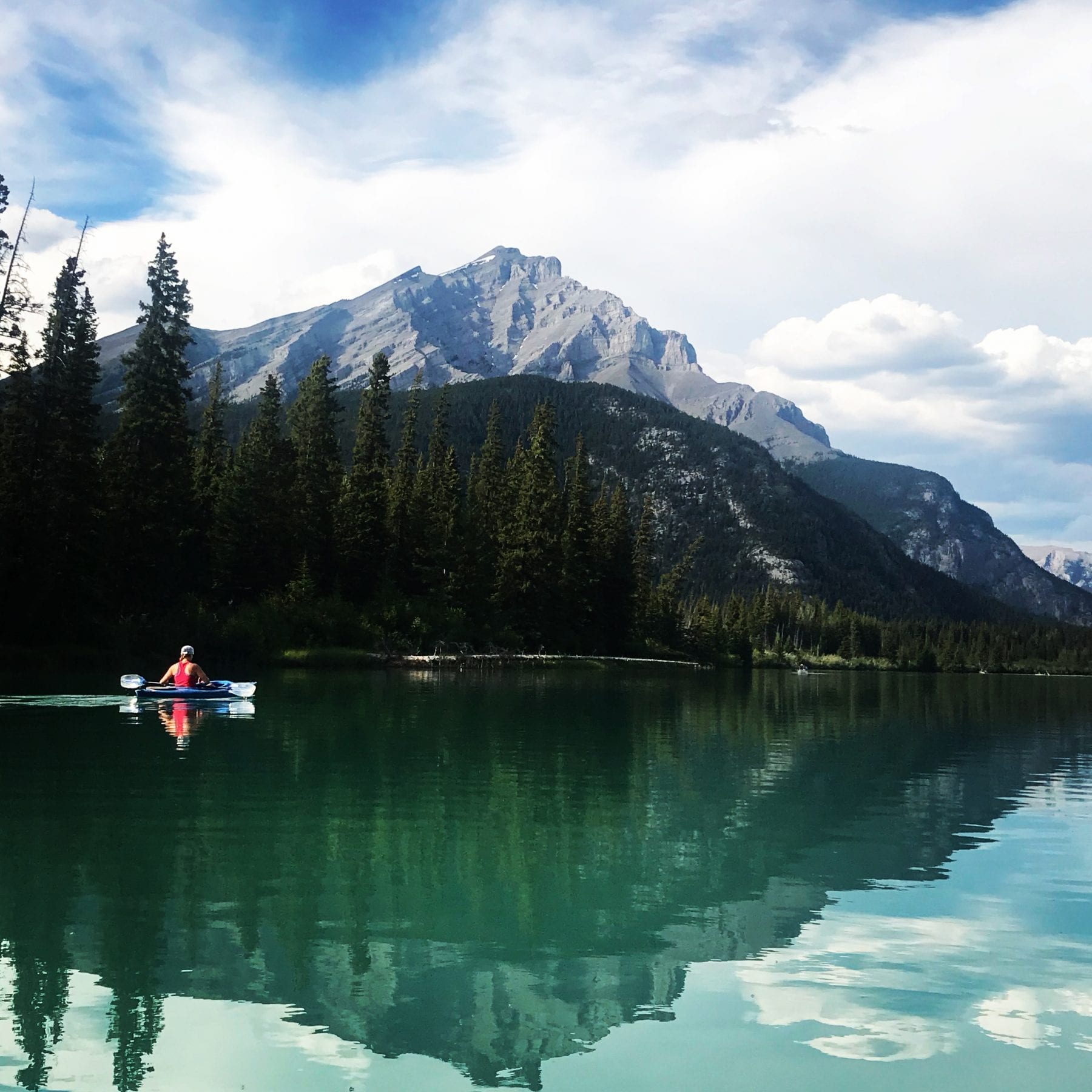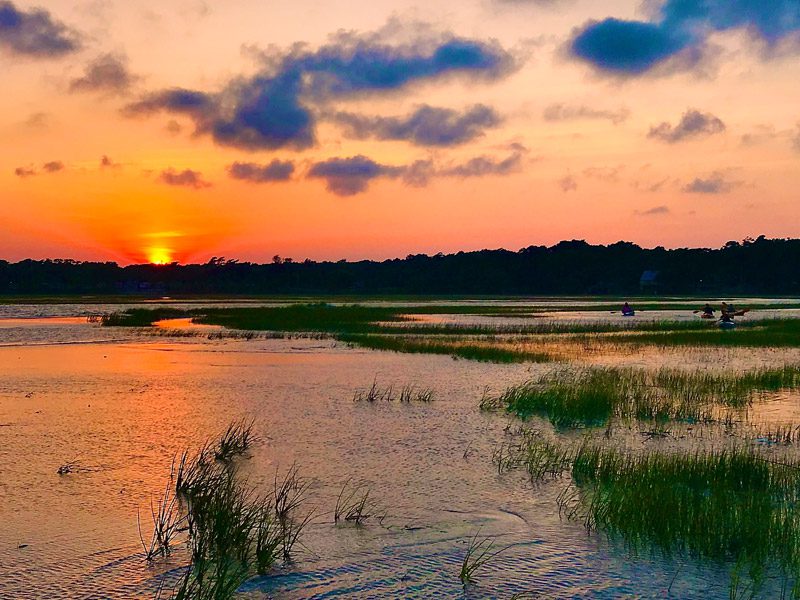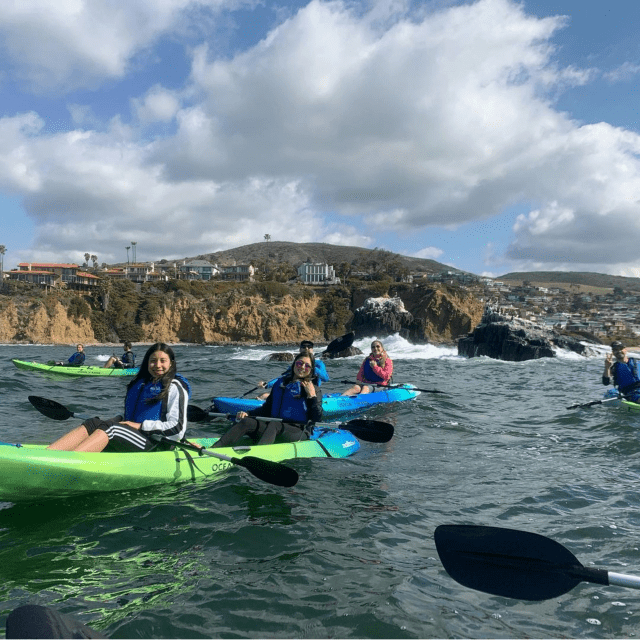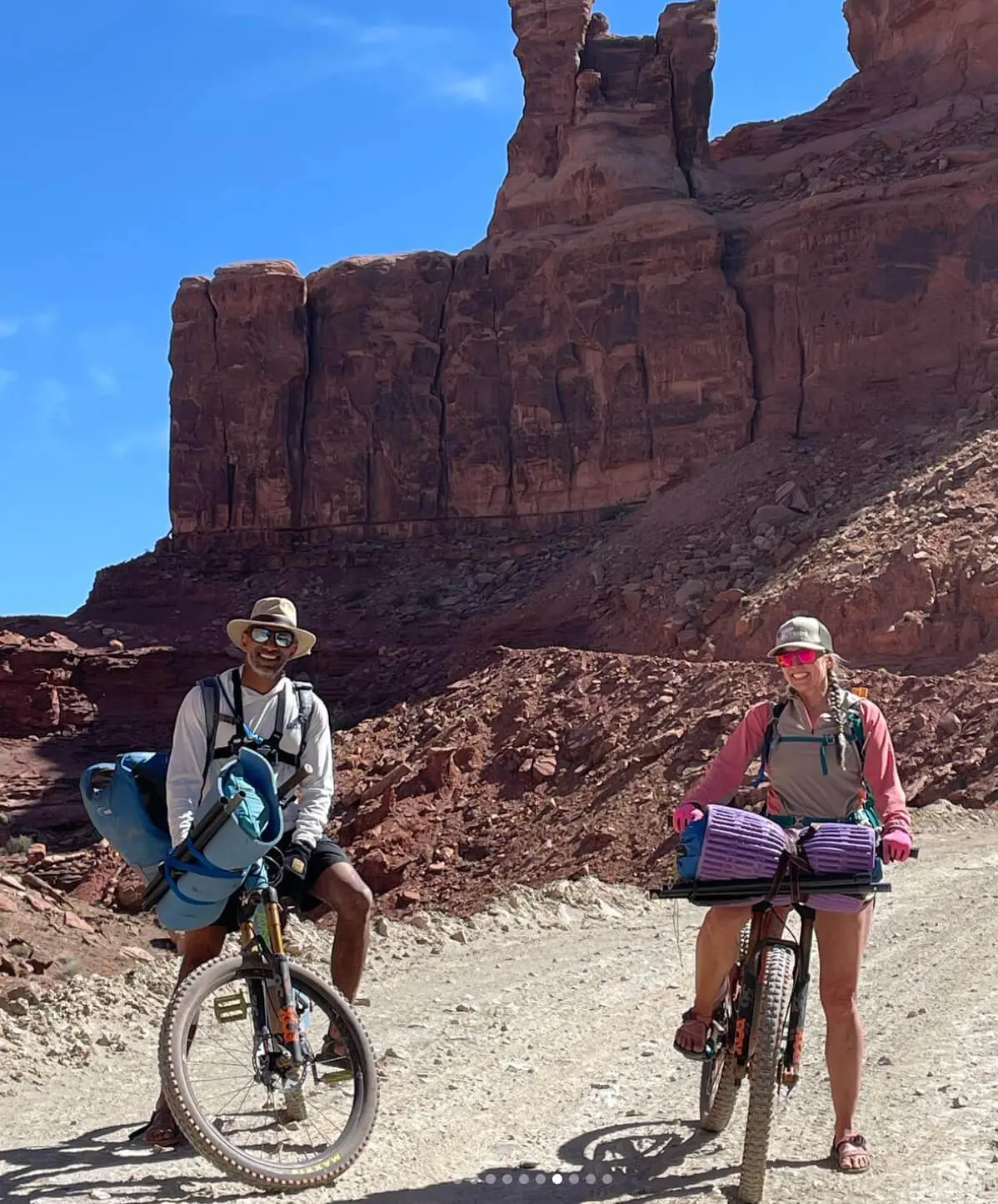Beginners Guide to Kayaking – Best Tips, Trips & Must-Have Essentials
New to kayaking? You’re in the right place.
You don’t need to be a pro – or even have paddled before – to jump into your first kayaking adventure. It’s one of the most beginner-friendly ways to explore the outdoors, letting you experience nature from a whole new angle. Whether you’re paddling your local river, exploring alpine lakes, or floating through mangrove tunnels on the coast, kayaking is an amazing way to unplug, get a workout, and tune in to nature.
This beginner’s guide is your go-to resource for getting started. We’ll break down what kind of kayak to choose for different situations, what to wear, how to stay safe, and where to go for the best beginner-friendly trips. You’ll also find answers to the most common kayaking questions, plus tips on how to paddle responsibly and protect the places you explore with Leave No Trace practices.
Let’s paddle into it.
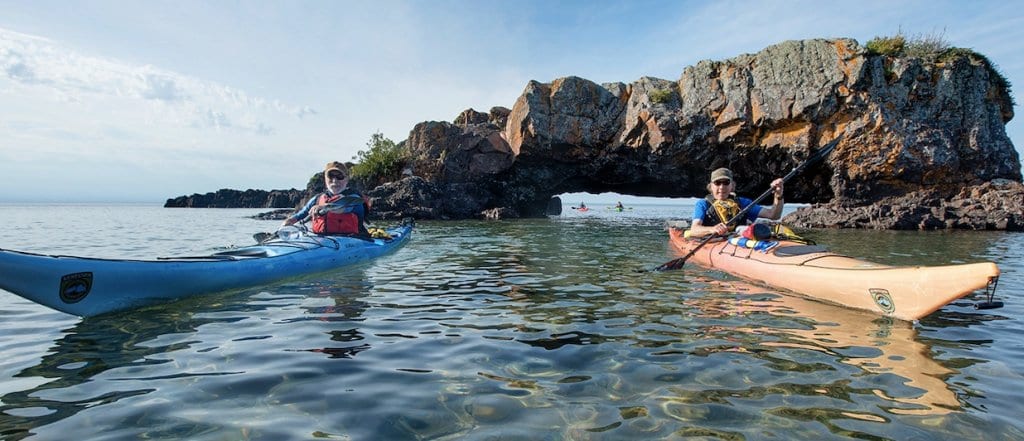
Health Benefits of Kayaking
To improve or maintain your fitness, you need to be active; however, as we age or experience injury, many of us seek low-impact exercise. Kayaking is an ideal solution for those looking for a cardiovascular exercise with low impact to sensitive joints such as knees and hips. Plus, paddling a kayak is an excellent way to gain upper body and core strength.
Kayaking serves up a powerhouse of health benefits for both your body and mind. Getting on the water, with the rhythmic motion of your paddling transcends mere physical activity—it becomes a meditative practice and wonderful stress reliever. Find your zen while kayaking.
Beginners Guide to Kayaking
Although you can watch how-to kayak videos, nothing beats learning by holding a paddle in your hand. Learning to kayak is easy, but best done in-person. If you don’t know a family member or friend who can show you the ropes, learn the basics by renting a kayak from an outfitter. Your rental and/or tour may include a lesson and/or a guide who can give you pointers along the way, explain kayak terms, and help you with all the necessary kayaking gear for beginners.
Kayaking Gear Guide – Choosing the Right Kayak
The right kayak for you depends on your level of skill, where you are kayaking, and if you are solo or in a pair.
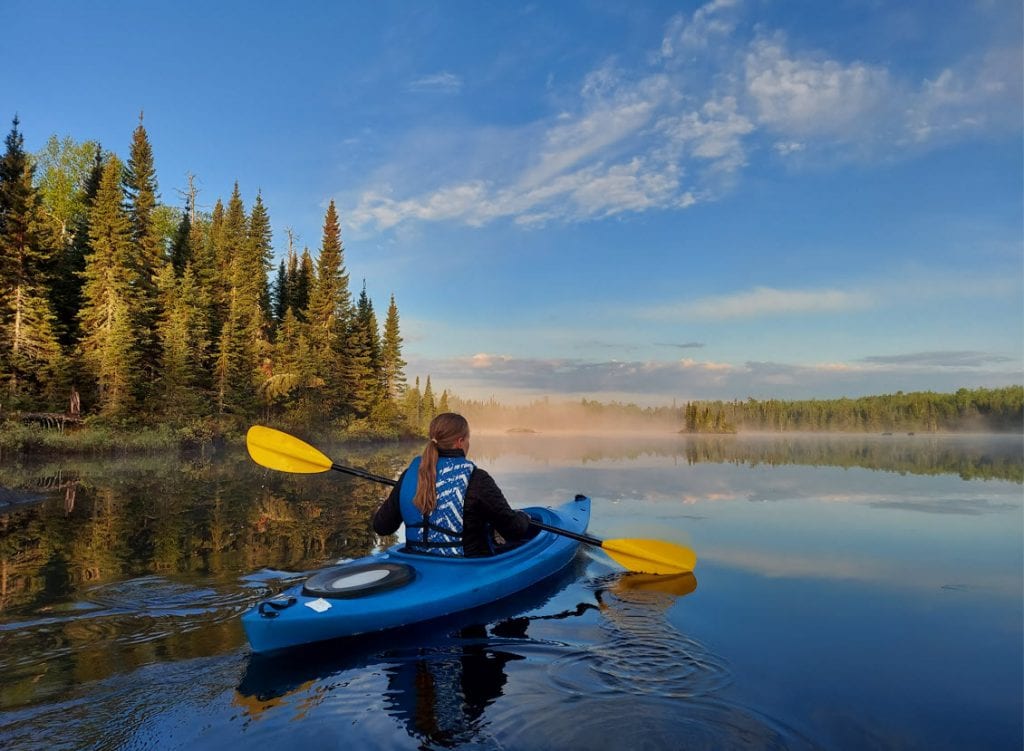
Recreational Kayaks
Recreational kayaks are designed for short, casual trips on calm waters like lakes and slow-moving rivers. They are usually wider, shorter, and more stable, making them great for beginners and for leisurely paddling. There are several types of recreational kayaks:
Sit-Inside Kayaks
Sit-in, or sit-inside, kayaks are used for river, lake, and sea kayaking trips. To prevent water from coming into the kayak, a skirt may be placed around the paddler to seal the cockpit. Thus, these kayaks are particularly useful in cold water destinations. Sit-in kayaks are very stable. However, the con of sit-in kayaks is the ease of getting in and out of the kayak, which can be a bit more difficult, especially in the middle of a lake!
Sit-on-Top Kayaks
Sit-on-top Kayaks are popular for rentals, especially in warmer lakes, rivers, and ocean trips. These kayaks are very stable and easy to get on and off. Sit-on-top kayaks are ideal for day trips and beaching.
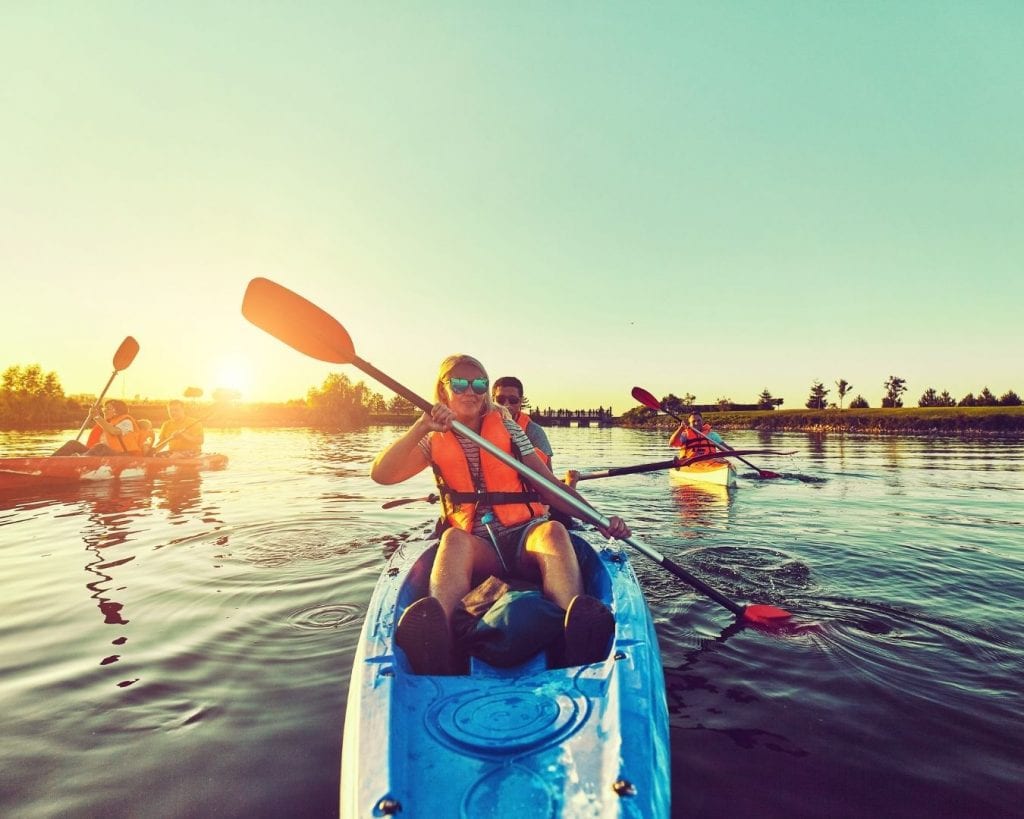
Touring & Sea Kayaks
Touring kayaks, or sea kayaks, are not recreational kayaks. They are built for longer trips and can handle rougher waters like those found in the ocean or large lakes. They are generally longer, narrower, and have more storage space for gear, making them more efficient and faster over long distances. These kayaks are designed for paddlers looking to cover more ground and possibly face more challenging conditions. So, if you’re planning on some longer journeys or exploring coastal areas, a touring or sea kayak would be the way to go.
Touring / Sea / Ocean kayaks also have a bulkhead on either end of the boat that creates extra buoyancy and helps the boat stay afloat in open water in case of a turnover.
Whitewater Kayaks
Whitewater kayaks are built for navigating fast-moving rivers and rapids. They are short, maneuverable, and often have a rounded hull to handle turbulent waters. Subtypes include playboats, creek boats, and river runners, each designed for different aspects of whitewater paddling.
We recommend taking a guided tour or lessons for all whitewater kayaking, unless you are an experienced whitewater kayaker. Whitewater kayaks are typically rented out by outfitters unless the renter can prove that they are an experienced whitewater kayaker, as the risk of flipping is very high. Specific training is required to learn to flip back over.
Kids Kayaks
Most often, kids can join adults in a tandem kayak and it’s best for them to sit in the front so you can keep an eye on what’s going on and help them paddle by providing guidance and instruction. When the kids are old enough or proficient enough at paddling and want their own kayaks, there are a few kids options available for them to enjoy their own journey. Check with the outfitter before renting a kids kayak to see which options they provide, understand the water conditions, and make sure that it’s the best decision for the kids to paddle by themselves.
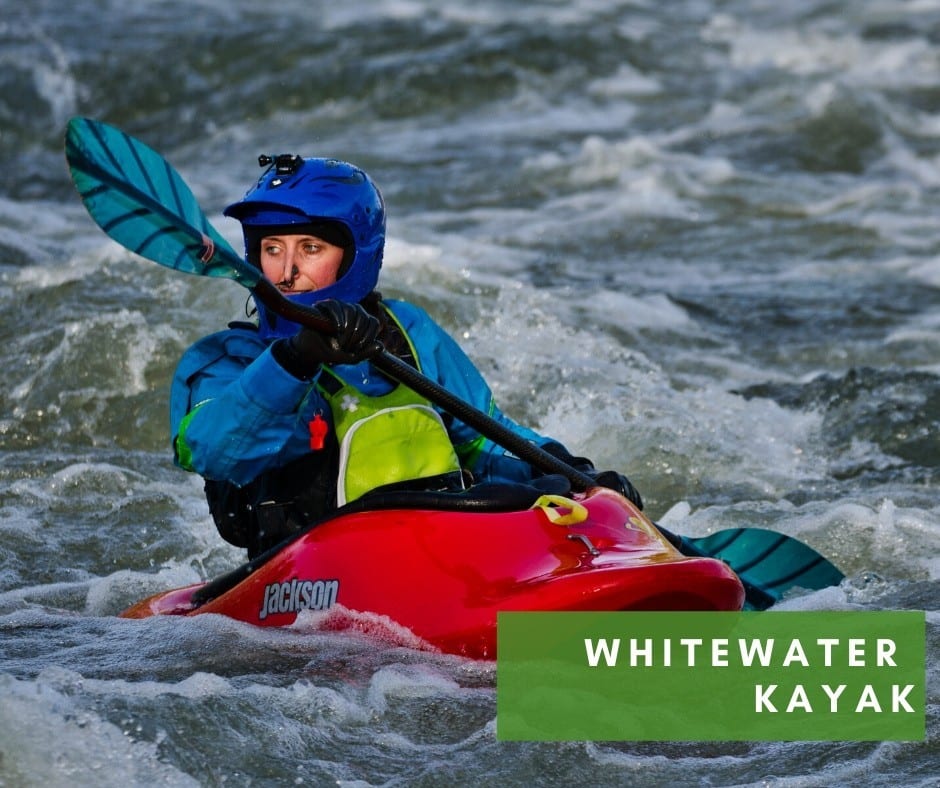
Kayak Types and Materials
Hard Sided (Composite)
A composite or hard-sided kayak is a kayak made from solid, rigid materials rather than being inflatable. These kayaks are typically constructed from fiberglass, Kevlar, carbon fiber, or plastic (such as polyethylene). Each material has its own advantages:
- Fiberglass: Lightweight, stiff, and offers excellent performance. It’s a popular choice for touring and sea kayaks due to its speed and efficiency.
- Kevlar: Even lighter than fiberglass and extremely strong. Kevlar kayaks are often used for long-distance touring because of their durability and ease of handling.
- Carbon Fiber: The lightest and most expensive option. Carbon fiber kayaks offer top-tier performance and are often used by serious paddlers who prioritize speed and agility.
- Plastic (Polyethylene): More affordable and very durable. While plastic kayaks are heavier and not as fast as composite materials, they can withstand rough treatment and are great for beginners or those paddling in rocky areas.
Composite and hard-sided kayaks are favored for their performance, durability, and ability to handle a wide range of water conditions. They provide excellent stability, tracking, and speed, making them ideal for everything from recreational paddling to hardcore touring and expeditions.
Inflatable
Inflatable kayaks are growing in popularity because they are lightweight, strong and portable. The technology to make inflatable kayaks has continued to improve, making them a great alternative to a traditional kayak that is safe, sturdy and reliable. These kayaks can be inflated in a matter of minutes at the start of the trip, which means you don’t need to have a large vehicle or kayak racks to be able to transport them.
Another ease of using an inflatable kayak is that they are easier to paddle for beginners but, they are slower than a recreational kayak. They are best suited for paddling with the flow of water where paddling efficiency is not as important. They are a great choice for rivers with small rapids, as they bounce easier off rocks than a hard shell kayak.
Both recreational and touring kayaks can come in inflatable.
Solo vs. Tandem Kayaks
All kayak types come in solo and tandem models. Your ideal choice should depend on two things: if you will be going alone or with another paddler and the weight of the kayak. Tandems are larger and can be more difficult to steer – but you also have the power of two people paddling. Solo kayaks are much lighter and easier to transport than tandems.
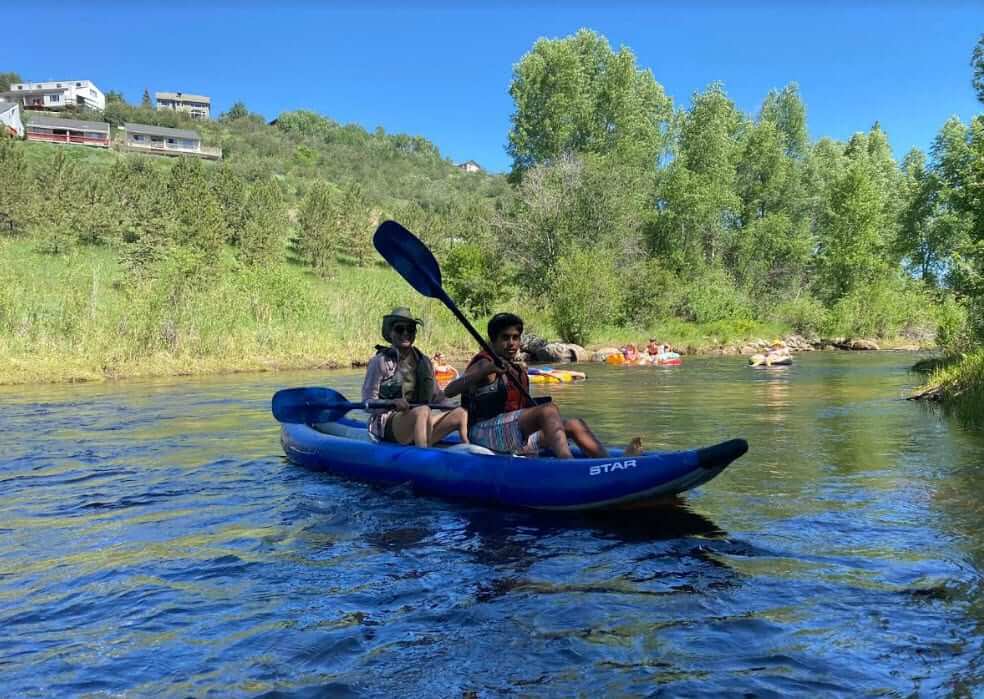
Kayaking Gear – It’s More than Just the Kayak
When kayaking, the essential items include a paddle and PFD. A waterproof drybag is also very helpful to store your personal items. If you plan on transporting your kayak, you will need tie down straps and/or a roof rack for your vehicle.
The kayak paddle is a two-sided paddle allowing the paddler to utilize both upper body strength as well as his/her core muscles. Most kayak paddles come apart in the middle for easier transport. They can be made from plastic, wood, metal, or carbon fiber. Prices vary depending on the material, weight, and brand. Many experienced kayakers recommend getting a paddle leash for when (not if) a capsizing or messy put in or take out event happens.
What to Wear Kayaking
For an in-depth review of what to wear kayaking, check out what to wear kayaking guide.
The attire for kayaking depends on the weather conditions where you will be paddling. The basics are good water shoes, SPF clothing, a hat, quick dry apparel, and neoprene gear/wetsuit.
Kayak Footwear
The best kayak footwear assists with your put in (launching the kayak) and take out (returning to dock/land) of the kayak. Both of which can be dangerous with a slippery surface or jagged rocks. Most seasoned kayakers choose sandals that have durable soles and toes; plus, they dry quickly. Some reputable brands are Keen, Teva, and Merrell.
Kayaking Clothes
Avid adventurers know that you must prepare for the weather. Many kayak trips expose paddlers to the sun; so, sun protection is crucial. SPF sunscreens can help protect, but the best combo is to use sunscreen as well as SPF clothing. Many designers make lightweight, quick-dry, long sleeve shirts for water sports lovers. Also, wearing a hat is wise; however, choose appropriately for the amount of wind and other elements.
The rest of your kayaking outfit is determined by the setting in which you are paddling. If you are in warmer temperatures, paddlers only need a bathing suit and/or quick dry shorts and top. However, if you are paddling in colder waters like many mountain lakes, rivers, and white water rapids, paddlers opt for neoprene apparel from tops, wetsuits, socks, and gloves.
Kayak Camping Gear List
If you plan on taking your time or doing a longer paddle, you may want to consider kayak camping. Some of the best wildlife and mother nature’s masterpieces come out after everyone else has returned his/her kayak and is heading back home. Kayak camping is a great way to break up a longer trip as well as to get back to basics. Although there are many camping niceties, you want to stick to lightweight, waterproof items as you will be getting wet and under your own power.
Stick to this simple gear list:
- Lightweight tent with rain fly
- Camping pad(s)
- Lightweight sleeping bag rated for the temperature
- Small gas stove
- Camping pot, cup, and utensils
- Dehydrated food
- Water filter
- Pocket knife or leatherman
- Headlamp
- Drysack for all of your gear – The best have backpack straps to assist in hauling to campsite
- Extra set of dry clothes and camp shoes – Wash out your clothes at the end of each day with an extra set ready for you. Don’t forget to dry out your kayaking shoes at camp at night.
- Lighter for lighting the gas stove is starter doesn’t work as well as if campfires are permitted
- Whistle
Kayak Safety Equipment
Regardless of what type of kayaking you select , make sure that you are a competent swimmer. Not all, but most kayak trips include at least one spill. For safety, many recreation areas require every kayaker to wear a personal floatation device (PFD). Although cell service is available for some kayaking trips, you may want to investigate purchasing a satellite communication device for any emergencies that occur outside of cellular service.
Best Places to Kayak in the United States
Once the kayak gear and kayaking clothing is covered, the next question is often: where to kayak near me?! Here are some favorite kayaking destinations across the US, as well as routes and outfitters along the way.
Flatwater River Kayaking
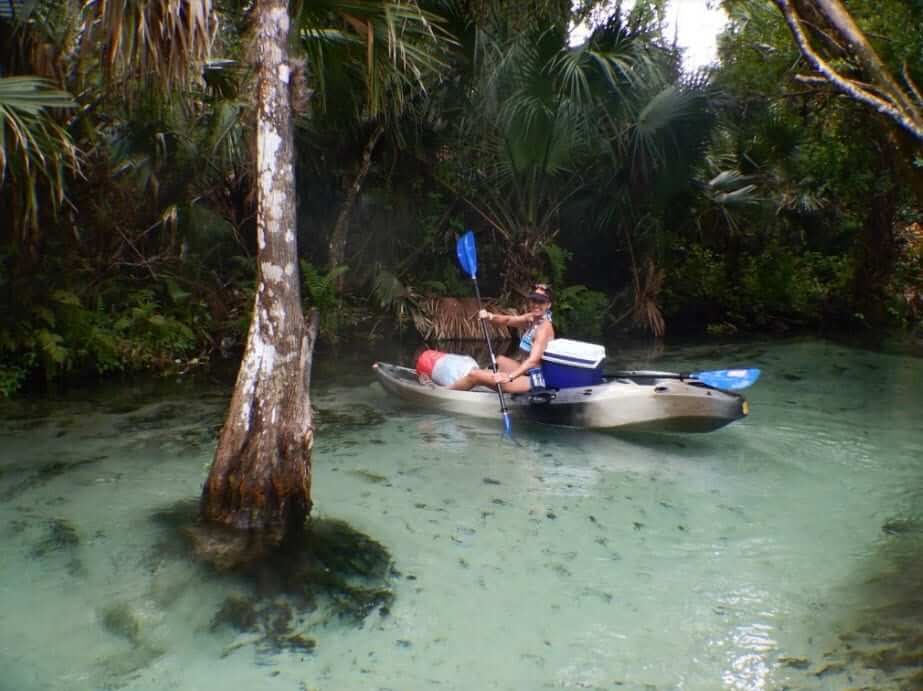
Crystal River, Florida
For a dose of real Florida, away from Disneyland and the neon lights of South Beach, head for Crystal River in Northern Florida. You can get close to nature by paddling alongside manatees, alligators, and countless bird species. Crystal River is one of the top paddling destinations in Florida for a good reason. We recommend private and small group kayak tours in Crystal River
Austin, Texas – Lady Bird Lake / Colorado River
Paddle right through the heart of downtown Austin on the calm, dam-controlled waters of Lady Bird Lake, part of the lower Colorado River. This flatwater stretch is perfect for beginners—no rapids, just skyline views, scenic bridges, and maybe a turtle or two sunbathing along the shoreline. Joining a guided kayak trip of the area is a great way to see the city while escaping into nature.
Deschutes River, Oregon – Lower Sections
While parts of the Deschutes River are famous for whitewater, the lower sections near Bend offer mellow, meandering currents ideal for flatwater paddling. Paddle past pine forests, lava rock formations, and volcanic landscapes on one of Oregon’s most iconic rivers. It’s a favorite for beginner kayakers, families, and anyone chasing that peaceful, alpine-river vibe without the gnarly rapids.

Napa, CA
Although Napa is world-renowned for its wine, the Napa River in California is a great spot to kayak with or sans wine. If you are looking to beat the crowds for a smooth, calm paddle, escape to Napa River for kayaking. Rent a kayak or SUP or try a guided tour to experience this local favorite in Napa Valley.
New River, Jefferson, North Carolina
The New River has a paddle for everyone. From relaxing day-trips to 5-day camping trips, the New River is very scenic. In fact, it is an American Heritage River. Rent a kayak for your paddle trip from local favorite and trusted TripOutside outfitter.
Myrtle Beach, South Carolina – Backwaters & Blackwater Rivers
Get off the beach and into the quiet, wild side of Myrtle Beach by paddling its scenic backwaters. Calm blackwater rivers like the Waccamaw wind through cypress swamps draped in Spanish moss, where you might spot turtles, birds, and even gators (from a safe distance). It’s flat, beginner-friendly paddling with a seriously serene Southern twist—and a great break from the crowds.
Flatwater Lake Kayaking
Lake Tahoe, California/Nevada
For an amazing scenic paddle with pristine nature all around you, head to Lake Tahoe. This may be one of the most scenic lake paddles on earth. However, be warned: the water looks very inviting, but it is rather chilly. Experts recommend layers and neoprene socks.
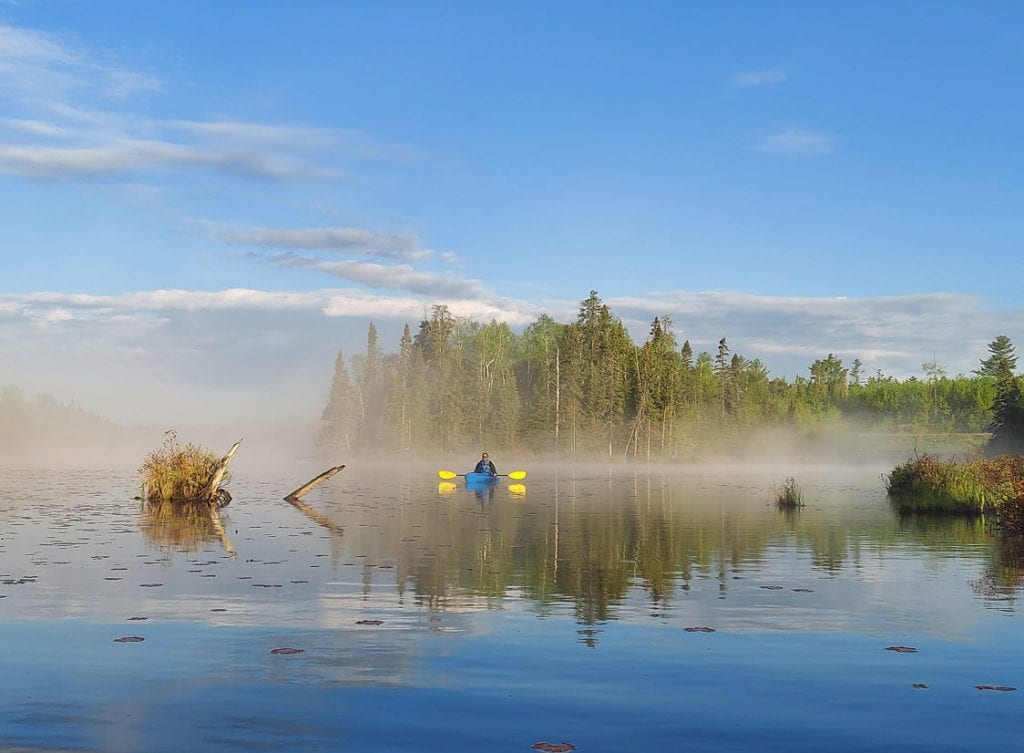
Boundary Waters Canoe Area, Minnesota
To escape the crowds, the Boundary Waters Canoe Area (BWCA) is a perfect spot. You can decide to kayak or canoe through endless routes covering multiple lakes without traffic jams. This is an ideal destination for kayaking and canoeing, as well as camping. For all your gear rental and insider’s information, check out Ely Outfitting Company or Piragis Northwoods Company in Ely, MN on the western edge of the wilderness.

Page, AZ – Lake Powell
Even though Arizona is known for being a dry state, it has some amazing lakes. Paddling Lake Powell near Page, AZ offers incredible views of the red rocks surrounding the lake and calm, refreshing waters. A local favorite is paddling majestic Antelope Canyon. For the best in tours and/or rental, check out Lake Powell Paddleboards and Kayaks.
Tempe Town Lake, Phoenix, Arizona
Smack in the middle of metro Phoenix, Tempe Town Lake offers a surprisingly chill paddling spot with big city views. This manmade reservoir is perfect for beginners looking for flat, predictable water and easy kayak rentals right on the shore. Sunrise and sunset paddles are especially rad here, with reflections of downtown Tempe and desert skies lighting up the water. It’s a quick escape that doesn’t feel like you’re in the middle of the fifth-largest city in the U.S.
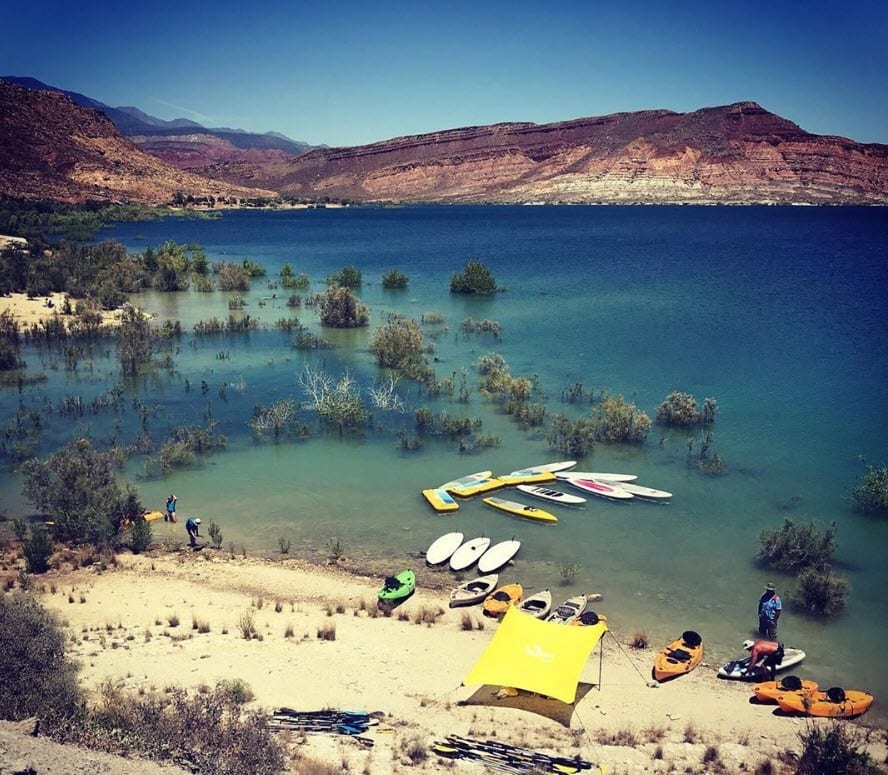
Quail Creek Reservoir, Hurricane, Utah
Tucked between red rock cliffs and desert peaks, Quail Creek Reservoir is a hidden gem for flatwater kayaking in southern Utah. The lake’s calm, clear waters make it ideal for beginners—and the scenery is next-level, with views of Pine Valley Mountain and sandstone ridgelines all around. Located just outside of St. George and not far from Zion, it’s a great place to paddle without the crowds. Bonus: the warm water makes it one of the most comfortable paddling spots in the state.
Sea Kayaking
Laguna Beach, CA
For an unforgettable paddle along an amazing coastline, Laguna Beach is the ultimate. With a 25,000-acre marine preserve, you are bound to spot abundant sea life, including sea lions, dolphins, and whales on your Laguna kayak adventure.
Homer, AK
If you’re ready to level up your sea kayaking game, Homer is pure Alaskan adventure. This coastal town on the Kenai Peninsula offers jaw-dropping paddles across Kachemak Bay, where you might spot otters, puffins, and even whales as you cruise past glaciers and rugged coastline. It’s definitely a more remote experience, but local guides make it totally doable for beginners—with gear, safety, and logistics all dialed in.
Haleiwa, O‘ahu, Hawai‘i
Skip the crowds of Waikiki and head north to Haleiwa for a more laid-back, beginner-friendly sea kayaking scene. Paddle the calm, clear waters of the North Shore where you can explore coral reefs, spot sea turtles, and cruise past world-class surf breaks (from a safe distance). The mellow conditions around Haleiwa Harbor and nearby Anahulu River make this a great launch point for first-timers looking to explore Hawai‘i by paddle.
River Kayaking with Rapids
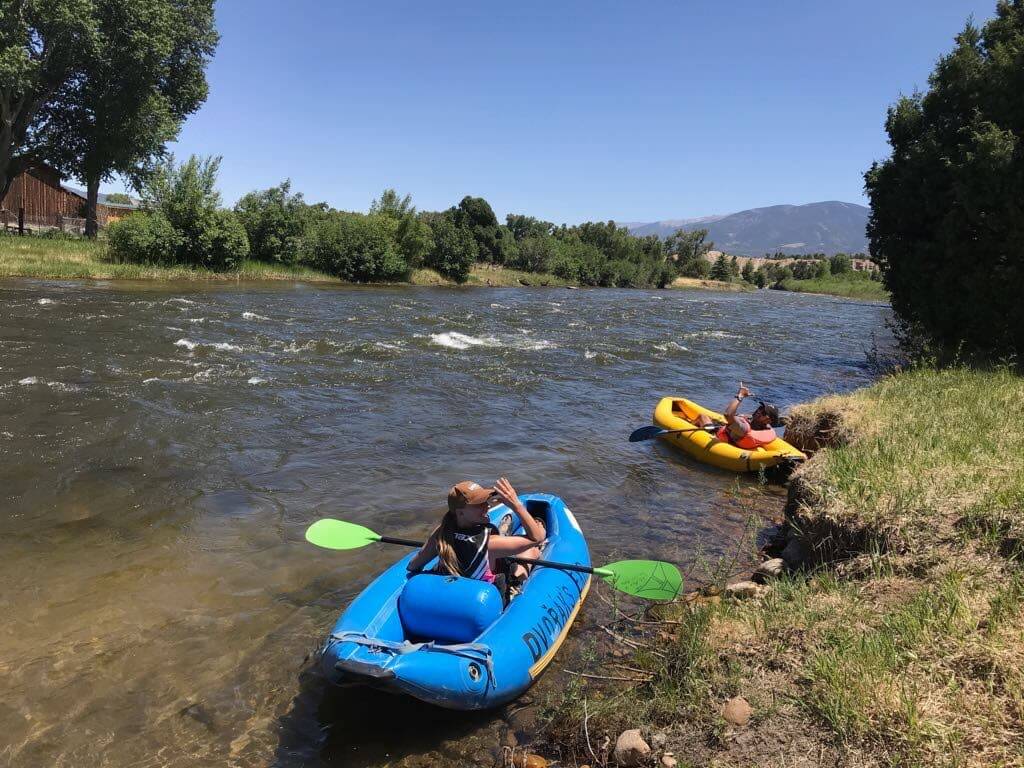
Salida, CO
For some of the best river kayaking, take a full day or half-day to paddle along the Arkansas River in Colorado. The river offers exciting rapids surrounded by the beauty of the Rockies – this area boasts 14 peaks over 14,000 feet! Locals recommend inflatable kayaking – book with the best, whether you want a rental or guided adventure.
Moab, UT
With an epic backdrop of the red rock canyons of Moab, Utah, you can’t go wrong with a kayak adventure whether on the Colorado or Green Rivers. These paddle trips are worth writing home about for sure. Learn more adventures in Moab including pack rafting and canyoneering in our Moab podcast!
Upper James River, Virginia
The Upper James River in Virginia has some incredible kayaking, rafting, and float opportunities. Enjoy the great mountain scenery and small class I and II rapids, depending on the section you chose to float. Whether you want to rent gear, get a shuttle, or a tour, find the best local outfitters.
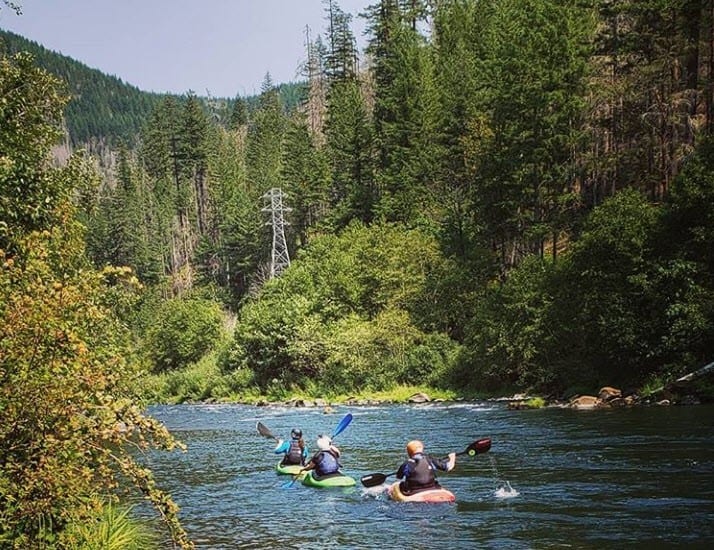
Deschutes River (middle sections), Bend, Oregon
The Deschutes River near Bend, Oregon is an adventurous spirit’s choice for river kayaking with gorgeous views as well as rapids. Below Bend, the Deschutes offers Class II–III whitewater with beautiful high desert scenery. Bend Kayak School offers kayak rentals and intro whitewater classes.
Leave No Trace While Kayaking
Part of the magic of kayaking is exploring wild places most people never see -but with that access comes responsibility. No matter where you’re paddling, it’s on all of us to help keep these places wild for the next paddler, and for the wildlife that call them home.
Here’s the beta on paddling responsibly, following Leave No Trace (LNT) principles on the water:
- Pack it in, pack it out – That granola bar wrapper? Your pup’s treat bag? It all needs to come back with you. Trash and food scraps don’t belong in the water or on the shoreline.
- Respect wildlife – Don’t follow, feed, or try to get close to animals. Let them do their thing, and you do yours—from a distance.
- Stick to durable launch spots – Use designated launch ramps or durable surfaces like gravel, rock, or sand to avoid damaging fragile vegetation or shorelines.
- Minimize chemical use – Sunscreen and bug spray can be harmful to aquatic ecosystems. Choose reef-safe or biodegradable options when you can.
- Keep noise down – The quieter your paddle, the more you’ll see—and the less you’ll disturb birds, animals, and other paddlers.
- Don’t collect souvenirs – Shells, rocks, driftwood… as tempting as they are, leave them where you found them. They’re part of the ecosystem.
Kayaking connects us to nature in a way few activities can. Let’s keep that connection strong by protecting the waterways we explore—because clean rivers, lakes, and oceans don’t stay that way by accident.
Want to learn more? Check out these Leave No Trace guidelines for more details on how to paddle lightly.
Beginner Kayaking FAQs
Do I need to know how to swim to go kayaking?
While strong swimming skills aren’t required, you should be comfortable in the water and always wear a properly fitted PFD (personal flotation device). Many beginner kayaking tours take place in shallow, calm water and include safety instruction.
Is kayaking hard to learn?
Not at all! Most beginners can pick up the basics—like how to paddle, steer, and get in/out of the kayak—within their first outing. Starting with a guided tour is a great way to build confidence and learn proper techniques.
How do I find kayaking tours or rentals near me?
You can use platforms like TripOutside to search for beginner-friendly kayaking rentals and guided tours near your location. Filter by activity type, destination, and skill level to find the perfect paddle trip.
How safe is kayaking for beginners?
Kayaking is very safe when you follow basic precautions: wear a life jacket, check the weather and water conditions, stay close to shore, and choose beginner-friendly routes. Guided trips are highly recommended for first-timers.
What’s the difference between a sit-in and sit-on-top kayak?
Sit-on-top kayaks are more stable and beginner-friendly, especially in warm weather. Sit-in kayaks offer better protection from the elements and are ideal for colder or rougher water. Both are great, depending on your destination.
Power Your Next Adventure via Kayak
After getting our expert tips, tricks, and recommendations of the best U.S. kayaking destinations and kayak gear guide, it’s time to exchange your gas pedal for a paddle. Power your next adventure via kayak. Ready, set, paddle!
Happy Kayaking!
Post contributed by Author and Adventurer, Heidi Siefkas. Her favorite kayaking destinations listed above are Crystal River, Florida as well as O‘ahu Hawai‘i.

